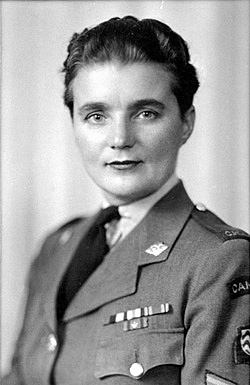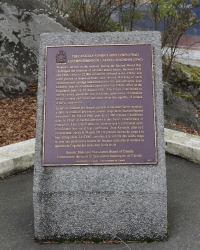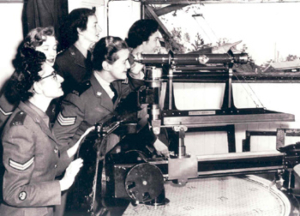Jerri Mumford
“Go West, Young Woman”
“Go West, Young Woman”
By Helen Cowhig

Jerri Mumford of the Canadian Womens Army Corps (CWAC), pictured in her uniform. At one time Jerri commanded her own women’s service corps in Halifax.
Without women like Minnie (Jerri) Mumford, the Canadian Women’s Army Corps could not have achieved the organizational strength needed to attract quality volunteer candidates into the military.
Sgt. Mumford was instrumental in establishing a service corps for women at a time when there was little official support for female participation in the army.
She was born January 4, 1909 in Devon, England, and grew into a spirited young woman who enjoyed going to the cinema to watch westerns. The movies made such an impression on her that she decided to go to Canada. It was the beginning of a great adventure, but also a risky move for a young woman of the time, requiring courage and a sense of self-reliance, both qualities Jerri seems to have possessed in abundance.
Like most things Jerri Mumford made up her mind to do, she succeeded in her goal, arriving in Canada in 1930 at the age of 21. Her immigration had to be sponsored, and a job secured. Her first employers were a young naval lieutenant and his wife; she worked as governess to their two young children. The lieutenant ultimately rose through the ranks to become Admiral Hibbard, and years later Jerri was to encounter him again in Victoria when he commanded the navy’s West Coast fleet.
By 1938, war in Europe seemed inevitable. Jerri, aware of the impending threat, became interested in organizing a women’s army corps, and in 1940 she was appointed Commandant of the Halifax Women’s Service Corps.
The Halifax Corps was eastern Canada’s equivalent of the women’s corps established by Col. Joan Kennedy in BC. It numbered more than 250 ‘girls’, and was patterned after the Auxiliary Territorial Service (ATS). They made history on Armistice Day 1940 by marching in uniform to the Halifax cenotaph, the first time a women’s service had ever participated in such an event.
A year later, the Canadian Women’s Army Corps was established, and soon began recruiting. Jerri promptly resigned her commission in the Halifax Women’s Service Corps and travelled West to join Joan Kennedy in the CWACs. It was an appropriate move for the woman who so loved Westerns. It was also a leap of faith, and represented a genuine loss of status for Jerri. From being Commandant of her own corps, her rank had dropped to private.

This cairn commemorating the CWACs is located outside CFB Esquimalt Naval & Military Museum in Esquimalt, BC, where a permanent exhibit highlights their contribution to the military, and the wider social impact of their wartime service.
On completing basic training, Jerri shipped out on the Queen Elizabeth I, which at the start of WWII, had been stripped of all its luxury trappings and refitted as a troop ship. Jerri and her CWAC companions aboard did not know their destination. After being escorted in convoy across the Atlantic, they arrived in London, England, to the sound of Big Ben striking the hour.
In London Jerri worked at the Judge Advocate General’s office at Canadian Military headquarters for two years. Her barracks were situated near the Thames river and St. Paul’s Cathedral, where some of the heaviest bombing raids were carried out. Jerri was #1 on the barracks fire team, responsible for directing the fire hoses to any part of the building hit by incendiary bombs.
In spring 1944 Jerri and 21 other CWACs were told they were being transferred. They were taken to a hospital in Devon, where there were doctors, nurses and CWACs, but no patients. It was strange to have no injured, no wounded, no-one to care for. Only later did the realization sink in that the ’empty’ hospital was in fact being prepared for expected casualties from the D-Day invasion.
Two weeks later the CWACs left for Southampton, still with no real idea where they were headed, though some thought the eventual destination was France.
During the voyage they were constantly alerted to prepare for emergency drills. Eventually they discovered they were going to Italy. As they entered Gibraltar harbour, German U-boats attacked their convoy. A Canadian medical ship beside them was torpedoed, and in a horrifying few minutes, they watched as all aboard were lost. The harbour was a dreadful sight, with sunken battleships everywhere.
In 1944, Jerry Mumford was one of only 11 CWACs chosen to go with the invading forces to Italy. She sometimes worked days at a time without sleep in order to help evacuate the wounded.
In Naples, they were attached to a Canadian Medical Unit about to link up with the British 8th Army. One night, while driving in the blackout, their truck took a wrong turn and hit a bomb crater. Jerri was perched on a tin box in the rear of the vehicle and when the collision happened, she injured her back. She spent time in hospital and suffered for many years from the ill effects of the injury she sustained that night.
A year later, the CWACs were serving in the north of Italy when they were recalled to Britain. After VE day, Jerri was selected to train at Aldershot for the Victory parade through the streets of London. War was over.

Jerri Mumford (centre, looking through rangefinder) demonstrates use of the No 17 Depression Rangefinder for a group of CWACs at Mary Hill, 1956. Also pictured are Cpl D. Talbot (foreground), L/Cpl C. Fry, Lt Faryon and Capt D. Chedleigh.
Jerri returned to Canada and was discharged in 1945. She moved to Victoria, BC to take a job with the Department of Veterans Affairs.
Soon after coming to Victoria she joined the 5th Field Battery of the Victoria Militia. Fifteen years later, Jerri retired with the rank of Company Sergeant Major. She was awarded the 1939-1945 Star, the Italy Star, the Defence Medal, the Canadian Forces Decoration Medal, and the Victory Medal.
Two memories remained vivid for her. She never forgot the horror of watching the Canadian Medical Ship sink in Gibraltar. The other memory, a very emotional one, was of the lights coming on again in London and the bells ringing to signal the end of the Second World War.
Jerri Mumford died in Victoria on August 28, 2002, at the Lodge at Broadmead, where she had been a patient since May 1999.
Articles
Hours
7 Days a Week: 10:00 am – 3:30 pm
Monday to Friday: 10:00 am – 3:30 pm
Hours
Monday to Friday: 8:00 am – 4:00 pm
To confirm if we are open, please call (250) 363-5655 or (250) 363-4312
Naval & Military Museum
Info@NavalAndMilitaryMuseum.org
CFB ESQUIMALT NAVAL & MILITARY MUSEUM
PO Box 17000 Stn Forces
Victoria, BC V9A 7N2